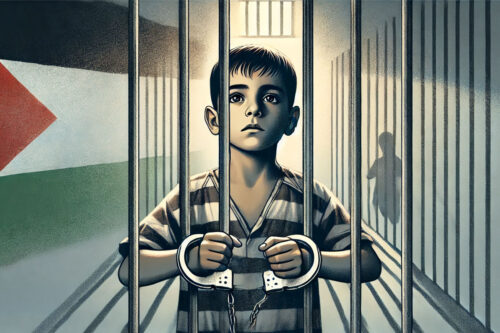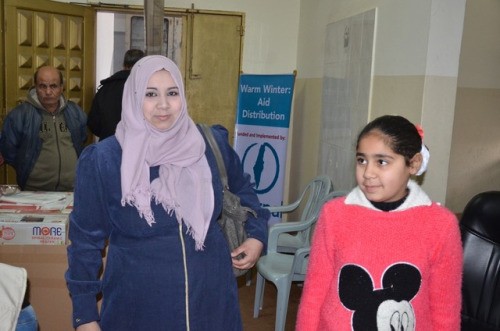Interpal Delegation in Lebanon: Day 2 – The Forgotten Refugees
Our first stop was a visit to the Palestinian Association for Human Rights (Witness), an independent association working towards improving the living conditions of Palestinian refugees in Lebanon and to protect their human rights. They train volunteers in camps and schools to be competent in dealing with human rights issues. In a country that does not recognise Palestinian refugees, whether first, second or third generation as citizens regardless of their being born there, this work is extremely important.
“Palestinians are forgotten in general by the international community; Palestinian refugees are even more so”, Director Mahmoud Hanafi told us. “Successive governments are looking at Palestinians as wanted men, camps as wanted camps… They are only acknowledged by the government when it comes to general security; when it comes to their social needs, they are invisible.”

We then visited Al Imani School that Interpal supports. As a response to the Syrian crisis, the school established Al Insani School – specifically to cater for Syrian refugees, free of charge. The school is attended by up to 400 children, aged between 7 and 18 years old. Syrian teachers are specially employed to help the children adjust to their new environment and minimise the negative impact on their education.

Interpal has provided a school bus that is used daily to transport the children from their homes to school and back. This allows children to not only attend school to continue their education whilst fleeing from danger in their home country but to also avoid it in the perilous areas in which they now reside.


Our next stop was Ain al-Hilweh, Lebanon’s largest Palestinian refugee camp, housing up to 120,000 refugees squeezed into 1.5 square kilometres.
The refugee camps of Lebanon have not expanded since they were set up in 1948 and 1967, meaning the population increased but the space for them didn’t. In 1984, there were 80,000 registered Palestinian refugees in Lebanon; that number has now increased to around 450,000. This not only means that camps suffer from chronic over-crowdedness but, with building permission very restricted due to Palestinians not having permanent stay status, refugees have to expand their living areas vertically leading to lack of sunlight in homes and a state of constant gloom.

Within the camp, there exists a haven known as the Khaled bin Waleed Medical Centre. Established in 1999, with its very first donation from Interpal – its main contributor – the centre has rapidly expanded from facilitating two small clinics and a pharmacy to now hosting 5 clinics, a laboratory and a minor surgery room. The centre benefits both Palestinian and Syrian refugees as well as locals from outside the camp. We went on to meet some beneficiaries.

Hajj Mahmoud is elderly, blind, extremely sick and bedridden with nobody to support him other than his wife who is also sick and recently had an open heart surgery following multiple heart attacks. She wears a cast on her arm having fallen down the stairs to their home and broken her arm. As we talked, she broke down in tears at their helpless situation. The centre checks up on them regularly to see how they are coping.

Wandering from one place to another in these refugee camps, it is strange how emotions can run from extremely low to extremely high.
Our next family visit was to 8 years old Malek Houran’s home. This being a particularly special visit for me as Malek is the child that I personally sponsor myself.
I remember when I first came across Malek’s plight; I had just started at Interpal and I found a random laminated card with a picture of a boy crying. Across it was written, “Will you bring a smile to his face?” or something similarly cheesy like that. However, I bought into it and asked the Sponsorship Team if he was already being sponsored. He wasn’t and so I became his sponsor. Little did I know at the time, that a year and a half later, I will be sitting in his home in Ain el Hilweh Camp in Lebanon, holding him as he smiles and giggles.

Malek is disabled and suffers from cerebral atrophy, a condition characterized by the wasting away of brain cells and tissues. This means that he often has convulsions and needs daily physiotherapy sessions as well as 24/7 care. Malek classifies as a “needy” child in Interpal’s Orphan and Needy Child Sponsorship programme. It is generally the case that donors opt for an “orphan” child to sponsor as opposed to, oftentimes, the more “needy” child.

Needy children are usually either disabled or suffer from severe poverty due to the lack of a primary earner in the family or sometimes, as with case of Malek, both. Coupled with rampant unemployment rates and stretching medical costs, it is impossible for families with a disabled child to support themselves without additional financial support.

It costs just £25 a month to sponsor a child like Malek, that’s only 83p a day. I urge anyone who is not currently sponsoring a child and has the financial capability, to start doing so today. Please call 020 8961 9993 and ask to speak to our Sponsorship team!
#PalestineFacts
Calculate your Zakat
Confused about how to calculate your Zakat? Try our simple-to-use calculator


![Fighters from Israel's pre-state militia occupying the village of Deir Yassin, April 1948 [IDF archive / Wikimedia]](http://www.interpal.org/wp-content/uploads/2025/04/Jewish_militias_in_the_village_of_Deir_Yassin_April_1948_cropped_and_edited-e1745166391491-500x333.jpg)
![A Palestine protest in London on May 15th 2021 [Ehimetalor Akhere Unuabona / Unsplash]](http://www.interpal.org/wp-content/uploads/2024/08/ehimetalor-akhere-unuabona-33W7GNRkUA0-unsplash-500x333.jpg)
